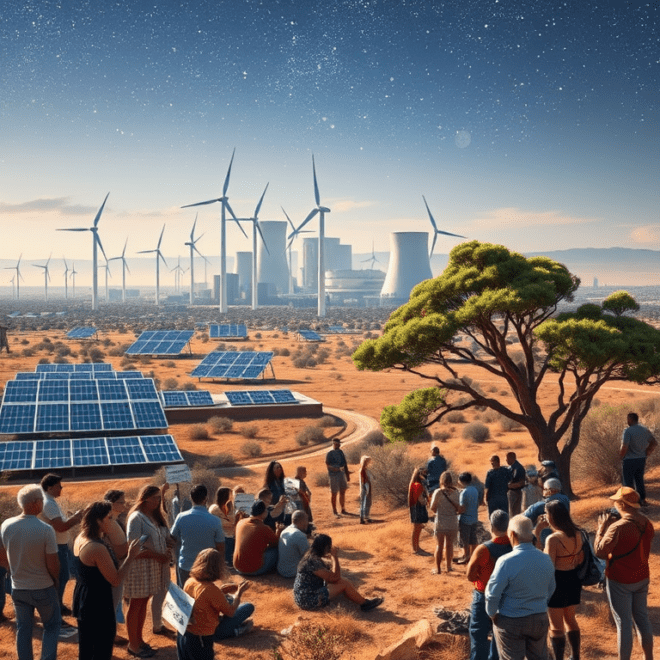
Abstract
The debate surrounding Australia’s energy future has intensified in recent years, particularly with the proposal by Peter Dutton, leader of the Liberal Party, to pursue nuclear power as a viable energy source. This paper critically examines the arguments for and against Dutton’s nuclear power plan, analysing its potential benefits and drawbacks in the context of Australia’s unique geographical, economic, and environmental landscape. By assessing the feasibility, safety, economic implications, and environmental impact of nuclear energy, this research aims to provide a comprehensive understanding of whether nuclear power is indeed the best option for Australia.
Introduction
As the world grapples with the urgent need to transition to sustainable energy sources, Australia finds itself at a crossroads. With abundant natural resources and a growing demand for clean energy, the country must decide on the most effective path forward. Peter Dutton’s proposal to embrace nuclear power has reignited a long-standing debate about the role of nuclear energy in Australia’s energy mix. This paper seeks to explore the viability of Dutton’s plan by presenting both sides of the argument, supported by empirical evidence and expert opinions.
Background
Australia’s energy landscape has historically been dominated by fossil fuels, particularly coal and natural gas. However, increasing concerns over climate change and the need for energy security have prompted discussions about diversifying the energy portfolio. The introduction of renewable energy sources, such as solar and wind, has made significant strides, yet challenges remain regarding reliability and storage. In this context, nuclear energy has emerged as a potential alternative, offering a low-carbon solution to meet growing energy demands.
Arguments in Favor of Nuclear Power
1. Low Carbon Emissions
Proponents of nuclear power argue that it is a crucial component of a low-carbon energy strategy. According to the International Atomic Energy Agency (IAEA), nuclear energy is responsible for approximately 10% of the world’s electricity and accounts for about 30% of global low-carbon electricity generation (IAEA, 2021). By investing in nuclear power, Australia could significantly reduce its greenhouse gas emissions, helping to meet international climate commitments under the Paris Agreement.
2. Energy Security and Reliability
Advocates assert that nuclear power can enhance energy security by providing a stable and reliable source of electricity. Unlike renewable sources, which are subject to fluctuations due to weather conditions, nuclear power plants can operate continuously, supplying a consistent baseload of energy. This reliability is particularly important for industrial sectors and urban areas that require uninterrupted power supply.
3. Economic Benefits
Supporters of Dutton’s plan highlight the potential economic benefits of nuclear power. The construction and operation of nuclear facilities could create thousands of jobs, stimulate local economies, and contribute to technological advancements in the energy sector. Furthermore, a well-regulated nuclear industry could attract significant investment, positioning Australia as a leader in nuclear technology.
4. Technological Advancements
Advancements in nuclear technology, such as small modular reactors (SMRs) and next-generation reactors, have made nuclear power safer and more efficient. These innovations promise to address many of the safety concerns historically associated with nuclear energy, making it a more appealing option for countries considering its adoption (World Nuclear Association, 2022).
Arguments Against Nuclear Power
1. Safety Concerns
One of the most significant arguments against nuclear power is the inherent safety risks associated with nuclear energy production. High-profile accidents, such as Chernobyl and Fukushima, have left a lasting impact on public perception and raised concerns about the potential for catastrophic failures. Critics argue that the risk of accidents, along with the long-term management of radioactive waste, poses an unacceptable threat to both human health and the environment.
2. High Initial Costs
The financial implications of establishing a nuclear power industry in Australia cannot be overlooked. The construction of nuclear power plants requires substantial upfront investment, often running into billions of dollars. This financial burden raises questions about the economic viability of nuclear power, especially in a landscape where renewable energy technologies are becoming increasingly cost-competitive (Lazard, 2021).
3. Environmental Impact
While nuclear power is low in carbon emissions, critics point out that it is not entirely free from environmental concerns. The mining and processing of uranium, as well as the management of nuclear waste, can have detrimental effects on local ecosystems. Additionally, the potential for groundwater contamination and the ecological impact of nuclear accidents are significant concerns for environmentalists.
4. Public Opposition
Public sentiment towards nuclear power in Australia has historically been negative, with strong opposition from various community groups and Indigenous organisations. The fear of accidents, combined with concerns about waste management and environmental degradation, has led to widespread resistance to nuclear energy projects. This public opposition could hinder the successful implementation of Dutton’s plan and create political challenges for its proponents.
Conclusion
The question of whether Peter Dutton’s nuclear power plan is the best option for Australia is complex and multifaceted. While nuclear energy presents potential benefits, including low carbon emissions, energy security, and economic opportunities, it also poses significant challenges related to safety, cost, environmental impact, and public perception. As Australia continues to navigate its energy transition, it is crucial to weigh these factors carefully and consider a diversified approach that includes a mix of renewable energy sources and, potentially, nuclear power.
Ultimately, the decision regarding nuclear energy should be informed by thorough research, public consultation, and a commitment to ensuring the safety and well-being of all Australians. As the energy landscape evolves, ongoing dialogue and critical analysis will be essential in determining the most sustainable and effective path forward for Australia’s energy future.
References
Amid Global Crises, Nuclear Power Provides Energy Security with Increased Electricity Generation in 2021. International Atomic Energy Agency. 2022.
World Nuclear Association.
Lazard’s Levelized Cost of Energy Analysis – Version 15.0. October 2021.


